Commercial Law: Analysis of Property Passing and Risk in Contracts
VerifiedAdded on 2022/08/15
|9
|2323
|15
Report
AI Summary
This report examines the core legal principles surrounding the passing of property and the allocation of risk in commercial transactions, particularly within the framework of the Sale of Goods Act 1979. The analysis begins with an overview of the key legal concepts, including the transfer of property in specific and unascertained goods, as defined by the Act. Several landmark cases, such as Ward v. Bignall, Dennant v. Skinner & Collom, Clough Mill v. Martin, Underwood Ltd v. Burgh Castle Brick & Cement Syndicate, and Nanka-Bruce v. Commonwealth Trust, are thoroughly reviewed to illustrate how courts have interpreted and applied these principles in various factual scenarios. The report then applies these legal principles to a case study involving a company, Soccer Kit.Com, which ordered goods from Active Textile Ltd. The analysis considers the impact of Active's liquidation, the status of prepared jerseys, printing machines, and stencils, and the effects of a warehouse flood. The report assesses when property in the goods passed from Active to Soccer Kit, the allocation of risk for damaged goods, and the application of the relevant legal tests, concluding with a determination of property transfer based on intention, contract terms, and circumstances, as well as the relevance of the various cases. The report emphasizes the importance of identifying the intention of the parties involved, the condition of goods, and the terms of the contract to determine when property passes and who bears the risk of loss or damage.
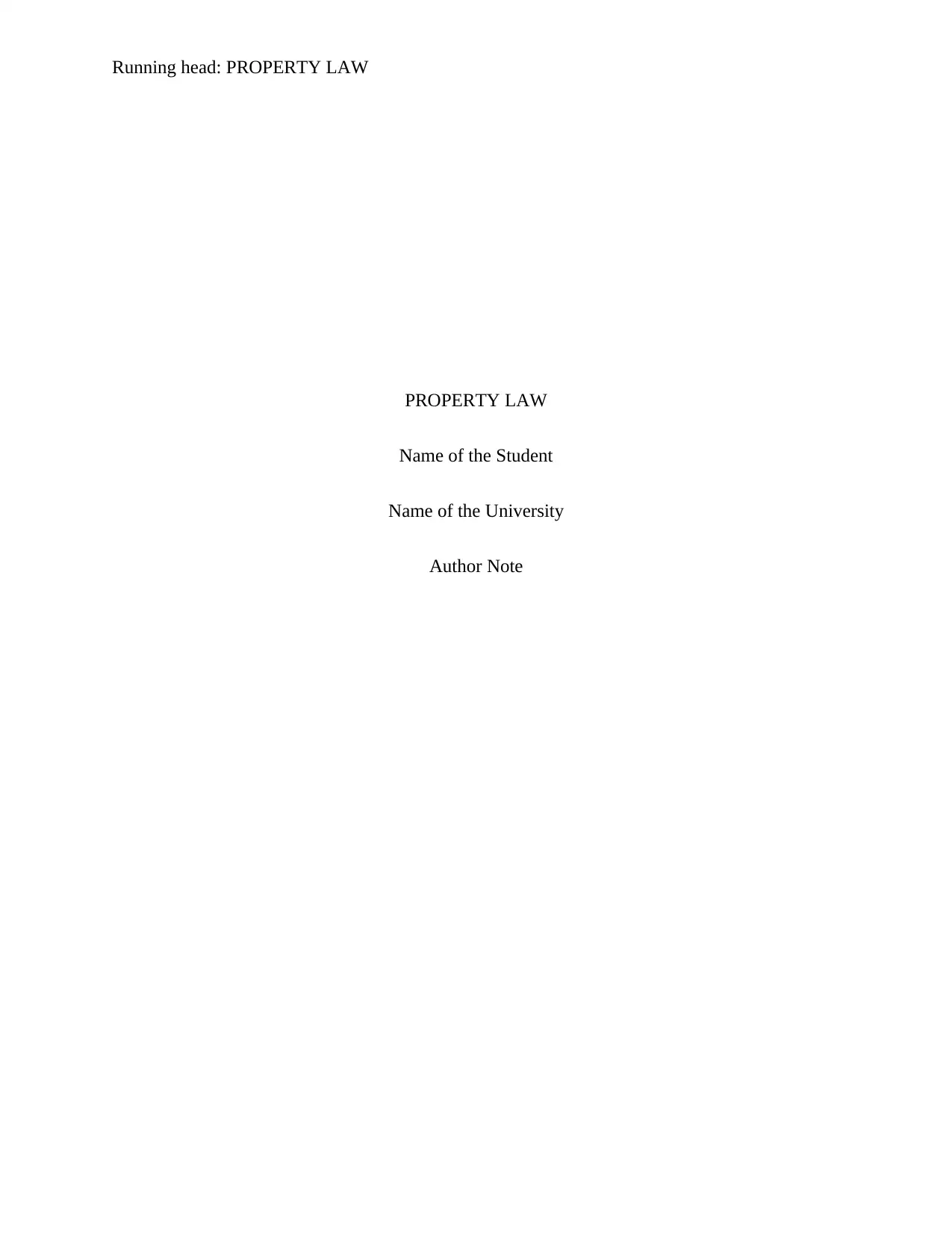
Running head: PROPERTY LAW
PROPERTY LAW
Name of the Student
Name of the University
Author Note
PROPERTY LAW
Name of the Student
Name of the University
Author Note
Paraphrase This Document
Need a fresh take? Get an instant paraphrase of this document with our AI Paraphraser
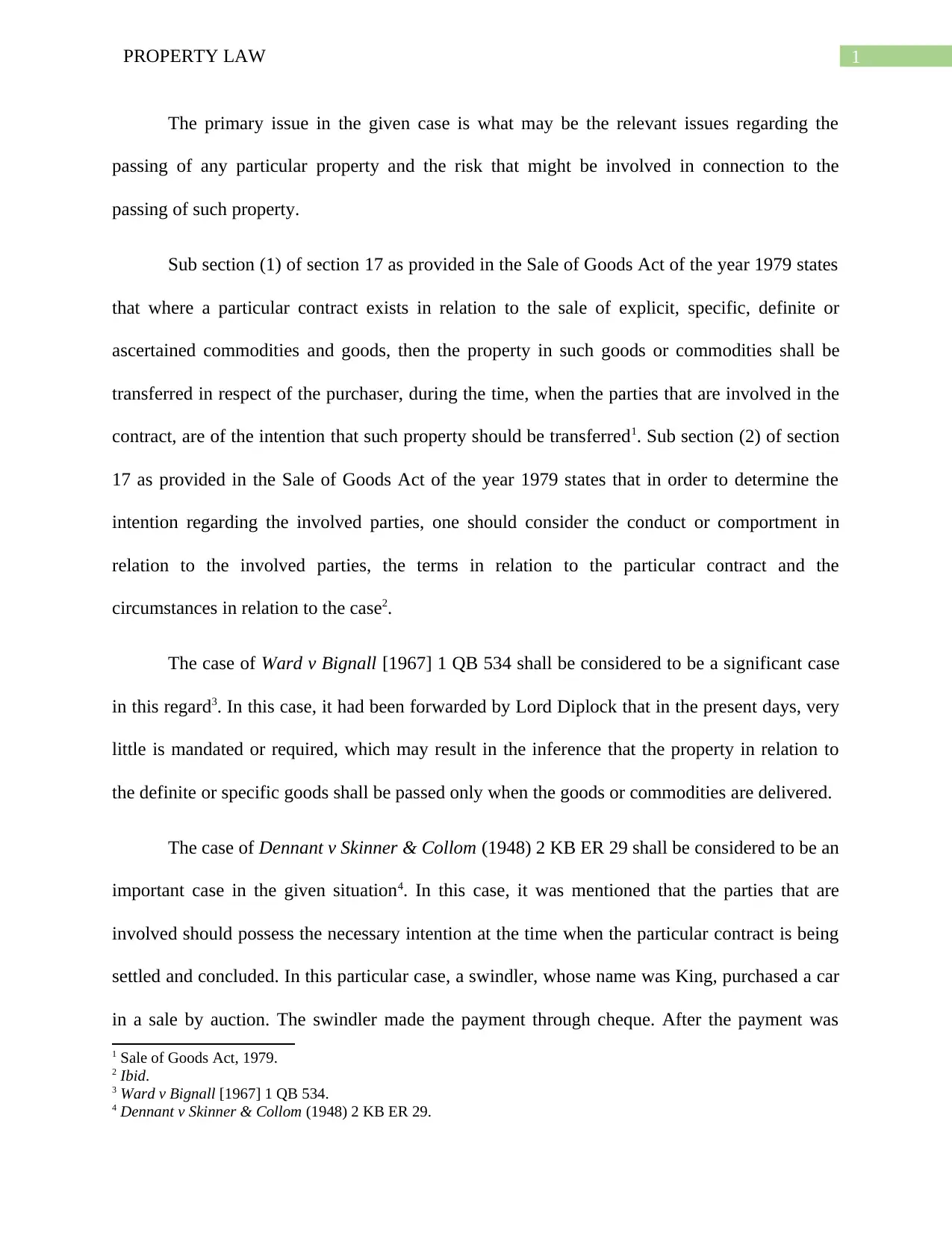
1PROPERTY LAW
The primary issue in the given case is what may be the relevant issues regarding the
passing of any particular property and the risk that might be involved in connection to the
passing of such property.
Sub section (1) of section 17 as provided in the Sale of Goods Act of the year 1979 states
that where a particular contract exists in relation to the sale of explicit, specific, definite or
ascertained commodities and goods, then the property in such goods or commodities shall be
transferred in respect of the purchaser, during the time, when the parties that are involved in the
contract, are of the intention that such property should be transferred1. Sub section (2) of section
17 as provided in the Sale of Goods Act of the year 1979 states that in order to determine the
intention regarding the involved parties, one should consider the conduct or comportment in
relation to the involved parties, the terms in relation to the particular contract and the
circumstances in relation to the case2.
The case of Ward v Bignall [1967] 1 QB 534 shall be considered to be a significant case
in this regard3. In this case, it had been forwarded by Lord Diplock that in the present days, very
little is mandated or required, which may result in the inference that the property in relation to
the definite or specific goods shall be passed only when the goods or commodities are delivered.
The case of Dennant v Skinner & Collom (1948) 2 KB ER 29 shall be considered to be an
important case in the given situation4. In this case, it was mentioned that the parties that are
involved should possess the necessary intention at the time when the particular contract is being
settled and concluded. In this particular case, a swindler, whose name was King, purchased a car
in a sale by auction. The swindler made the payment through cheque. After the payment was
1 Sale of Goods Act, 1979.
2 Ibid.
3 Ward v Bignall [1967] 1 QB 534.
4 Dennant v Skinner & Collom (1948) 2 KB ER 29.
The primary issue in the given case is what may be the relevant issues regarding the
passing of any particular property and the risk that might be involved in connection to the
passing of such property.
Sub section (1) of section 17 as provided in the Sale of Goods Act of the year 1979 states
that where a particular contract exists in relation to the sale of explicit, specific, definite or
ascertained commodities and goods, then the property in such goods or commodities shall be
transferred in respect of the purchaser, during the time, when the parties that are involved in the
contract, are of the intention that such property should be transferred1. Sub section (2) of section
17 as provided in the Sale of Goods Act of the year 1979 states that in order to determine the
intention regarding the involved parties, one should consider the conduct or comportment in
relation to the involved parties, the terms in relation to the particular contract and the
circumstances in relation to the case2.
The case of Ward v Bignall [1967] 1 QB 534 shall be considered to be a significant case
in this regard3. In this case, it had been forwarded by Lord Diplock that in the present days, very
little is mandated or required, which may result in the inference that the property in relation to
the definite or specific goods shall be passed only when the goods or commodities are delivered.
The case of Dennant v Skinner & Collom (1948) 2 KB ER 29 shall be considered to be an
important case in the given situation4. In this case, it was mentioned that the parties that are
involved should possess the necessary intention at the time when the particular contract is being
settled and concluded. In this particular case, a swindler, whose name was King, purchased a car
in a sale by auction. The swindler made the payment through cheque. After the payment was
1 Sale of Goods Act, 1979.
2 Ibid.
3 Ward v Bignall [1967] 1 QB 534.
4 Dennant v Skinner & Collom (1948) 2 KB ER 29.
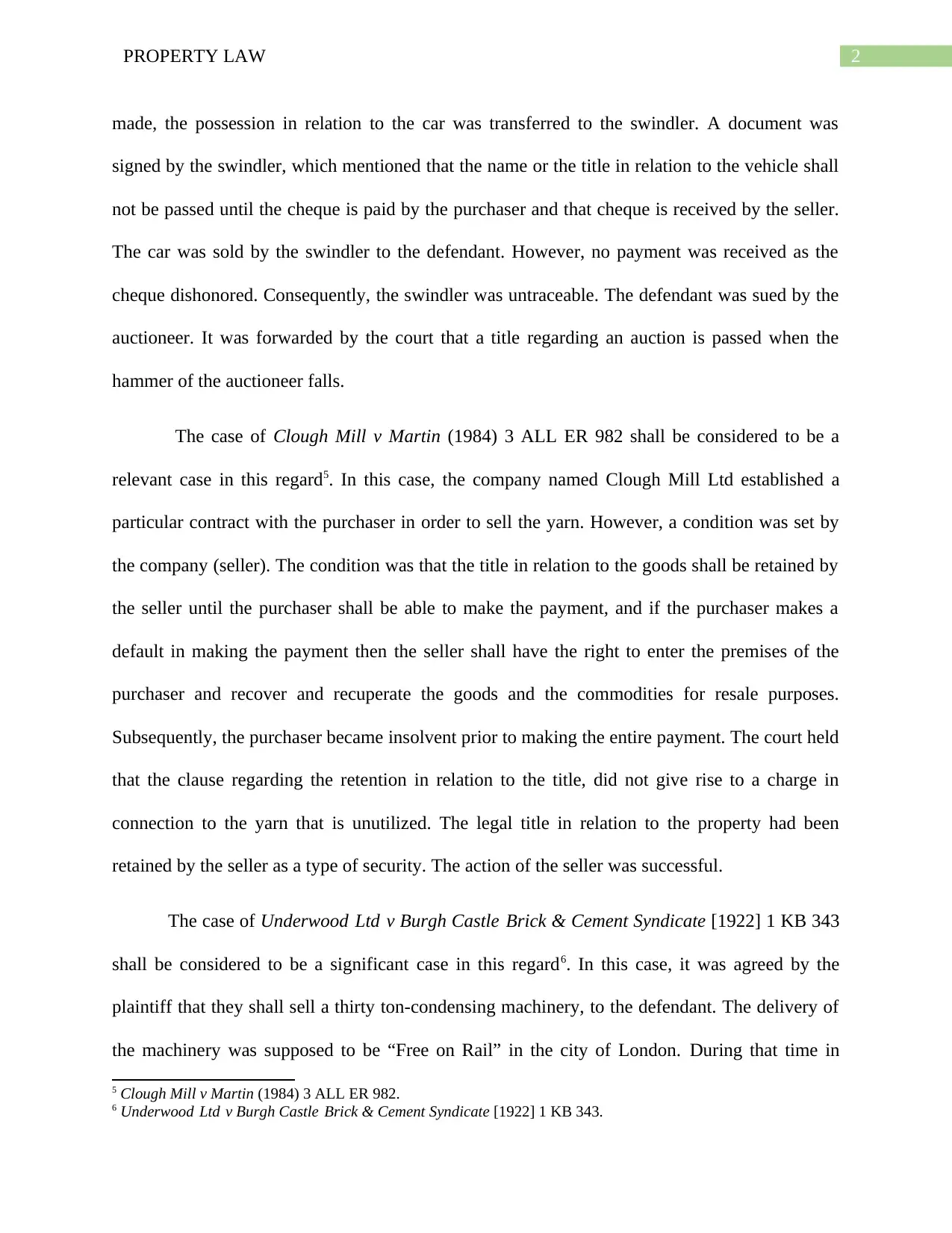
2PROPERTY LAW
made, the possession in relation to the car was transferred to the swindler. A document was
signed by the swindler, which mentioned that the name or the title in relation to the vehicle shall
not be passed until the cheque is paid by the purchaser and that cheque is received by the seller.
The car was sold by the swindler to the defendant. However, no payment was received as the
cheque dishonored. Consequently, the swindler was untraceable. The defendant was sued by the
auctioneer. It was forwarded by the court that a title regarding an auction is passed when the
hammer of the auctioneer falls.
The case of Clough Mill v Martin (1984) 3 ALL ER 982 shall be considered to be a
relevant case in this regard5. In this case, the company named Clough Mill Ltd established a
particular contract with the purchaser in order to sell the yarn. However, a condition was set by
the company (seller). The condition was that the title in relation to the goods shall be retained by
the seller until the purchaser shall be able to make the payment, and if the purchaser makes a
default in making the payment then the seller shall have the right to enter the premises of the
purchaser and recover and recuperate the goods and the commodities for resale purposes.
Subsequently, the purchaser became insolvent prior to making the entire payment. The court held
that the clause regarding the retention in relation to the title, did not give rise to a charge in
connection to the yarn that is unutilized. The legal title in relation to the property had been
retained by the seller as a type of security. The action of the seller was successful.
The case of Underwood Ltd v Burgh Castle Brick & Cement Syndicate [1922] 1 KB 343
shall be considered to be a significant case in this regard6. In this case, it was agreed by the
plaintiff that they shall sell a thirty ton-condensing machinery, to the defendant. The delivery of
the machinery was supposed to be “Free on Rail” in the city of London. During that time in
5 Clough Mill v Martin (1984) 3 ALL ER 982.
6 Underwood Ltd v Burgh Castle Brick & Cement Syndicate [1922] 1 KB 343.
made, the possession in relation to the car was transferred to the swindler. A document was
signed by the swindler, which mentioned that the name or the title in relation to the vehicle shall
not be passed until the cheque is paid by the purchaser and that cheque is received by the seller.
The car was sold by the swindler to the defendant. However, no payment was received as the
cheque dishonored. Consequently, the swindler was untraceable. The defendant was sued by the
auctioneer. It was forwarded by the court that a title regarding an auction is passed when the
hammer of the auctioneer falls.
The case of Clough Mill v Martin (1984) 3 ALL ER 982 shall be considered to be a
relevant case in this regard5. In this case, the company named Clough Mill Ltd established a
particular contract with the purchaser in order to sell the yarn. However, a condition was set by
the company (seller). The condition was that the title in relation to the goods shall be retained by
the seller until the purchaser shall be able to make the payment, and if the purchaser makes a
default in making the payment then the seller shall have the right to enter the premises of the
purchaser and recover and recuperate the goods and the commodities for resale purposes.
Subsequently, the purchaser became insolvent prior to making the entire payment. The court held
that the clause regarding the retention in relation to the title, did not give rise to a charge in
connection to the yarn that is unutilized. The legal title in relation to the property had been
retained by the seller as a type of security. The action of the seller was successful.
The case of Underwood Ltd v Burgh Castle Brick & Cement Syndicate [1922] 1 KB 343
shall be considered to be a significant case in this regard6. In this case, it was agreed by the
plaintiff that they shall sell a thirty ton-condensing machinery, to the defendant. The delivery of
the machinery was supposed to be “Free on Rail” in the city of London. During that time in
5 Clough Mill v Martin (1984) 3 ALL ER 982.
6 Underwood Ltd v Burgh Castle Brick & Cement Syndicate [1922] 1 KB 343.
⊘ This is a preview!⊘
Do you want full access?
Subscribe today to unlock all pages.

Trusted by 1+ million students worldwide
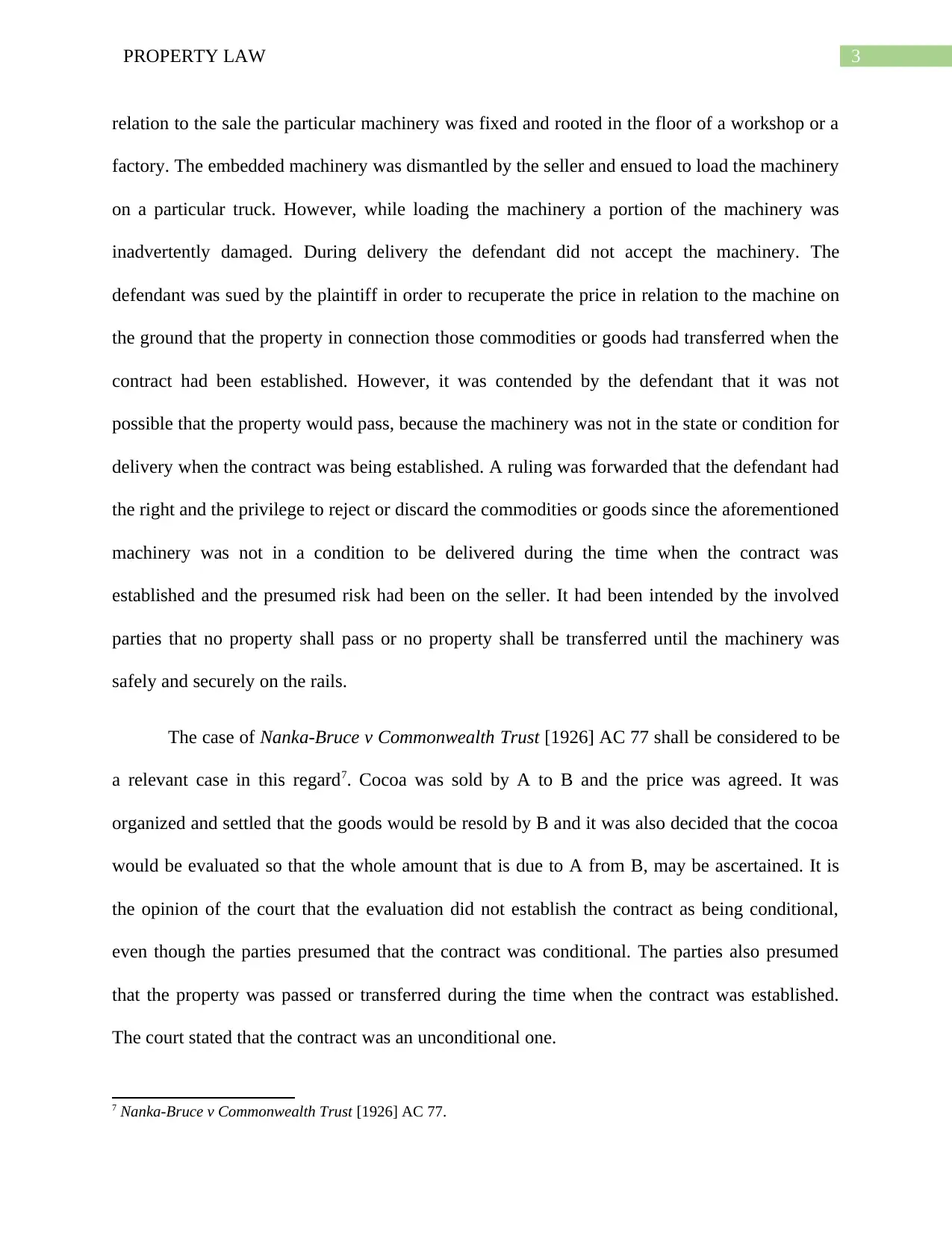
3PROPERTY LAW
relation to the sale the particular machinery was fixed and rooted in the floor of a workshop or a
factory. The embedded machinery was dismantled by the seller and ensued to load the machinery
on a particular truck. However, while loading the machinery a portion of the machinery was
inadvertently damaged. During delivery the defendant did not accept the machinery. The
defendant was sued by the plaintiff in order to recuperate the price in relation to the machine on
the ground that the property in connection those commodities or goods had transferred when the
contract had been established. However, it was contended by the defendant that it was not
possible that the property would pass, because the machinery was not in the state or condition for
delivery when the contract was being established. A ruling was forwarded that the defendant had
the right and the privilege to reject or discard the commodities or goods since the aforementioned
machinery was not in a condition to be delivered during the time when the contract was
established and the presumed risk had been on the seller. It had been intended by the involved
parties that no property shall pass or no property shall be transferred until the machinery was
safely and securely on the rails.
The case of Nanka-Bruce v Commonwealth Trust [1926] AC 77 shall be considered to be
a relevant case in this regard7. Cocoa was sold by A to B and the price was agreed. It was
organized and settled that the goods would be resold by B and it was also decided that the cocoa
would be evaluated so that the whole amount that is due to A from B, may be ascertained. It is
the opinion of the court that the evaluation did not establish the contract as being conditional,
even though the parties presumed that the contract was conditional. The parties also presumed
that the property was passed or transferred during the time when the contract was established.
The court stated that the contract was an unconditional one.
7 Nanka-Bruce v Commonwealth Trust [1926] AC 77.
relation to the sale the particular machinery was fixed and rooted in the floor of a workshop or a
factory. The embedded machinery was dismantled by the seller and ensued to load the machinery
on a particular truck. However, while loading the machinery a portion of the machinery was
inadvertently damaged. During delivery the defendant did not accept the machinery. The
defendant was sued by the plaintiff in order to recuperate the price in relation to the machine on
the ground that the property in connection those commodities or goods had transferred when the
contract had been established. However, it was contended by the defendant that it was not
possible that the property would pass, because the machinery was not in the state or condition for
delivery when the contract was being established. A ruling was forwarded that the defendant had
the right and the privilege to reject or discard the commodities or goods since the aforementioned
machinery was not in a condition to be delivered during the time when the contract was
established and the presumed risk had been on the seller. It had been intended by the involved
parties that no property shall pass or no property shall be transferred until the machinery was
safely and securely on the rails.
The case of Nanka-Bruce v Commonwealth Trust [1926] AC 77 shall be considered to be
a relevant case in this regard7. Cocoa was sold by A to B and the price was agreed. It was
organized and settled that the goods would be resold by B and it was also decided that the cocoa
would be evaluated so that the whole amount that is due to A from B, may be ascertained. It is
the opinion of the court that the evaluation did not establish the contract as being conditional,
even though the parties presumed that the contract was conditional. The parties also presumed
that the property was passed or transferred during the time when the contract was established.
The court stated that the contract was an unconditional one.
7 Nanka-Bruce v Commonwealth Trust [1926] AC 77.
Paraphrase This Document
Need a fresh take? Get an instant paraphrase of this document with our AI Paraphraser
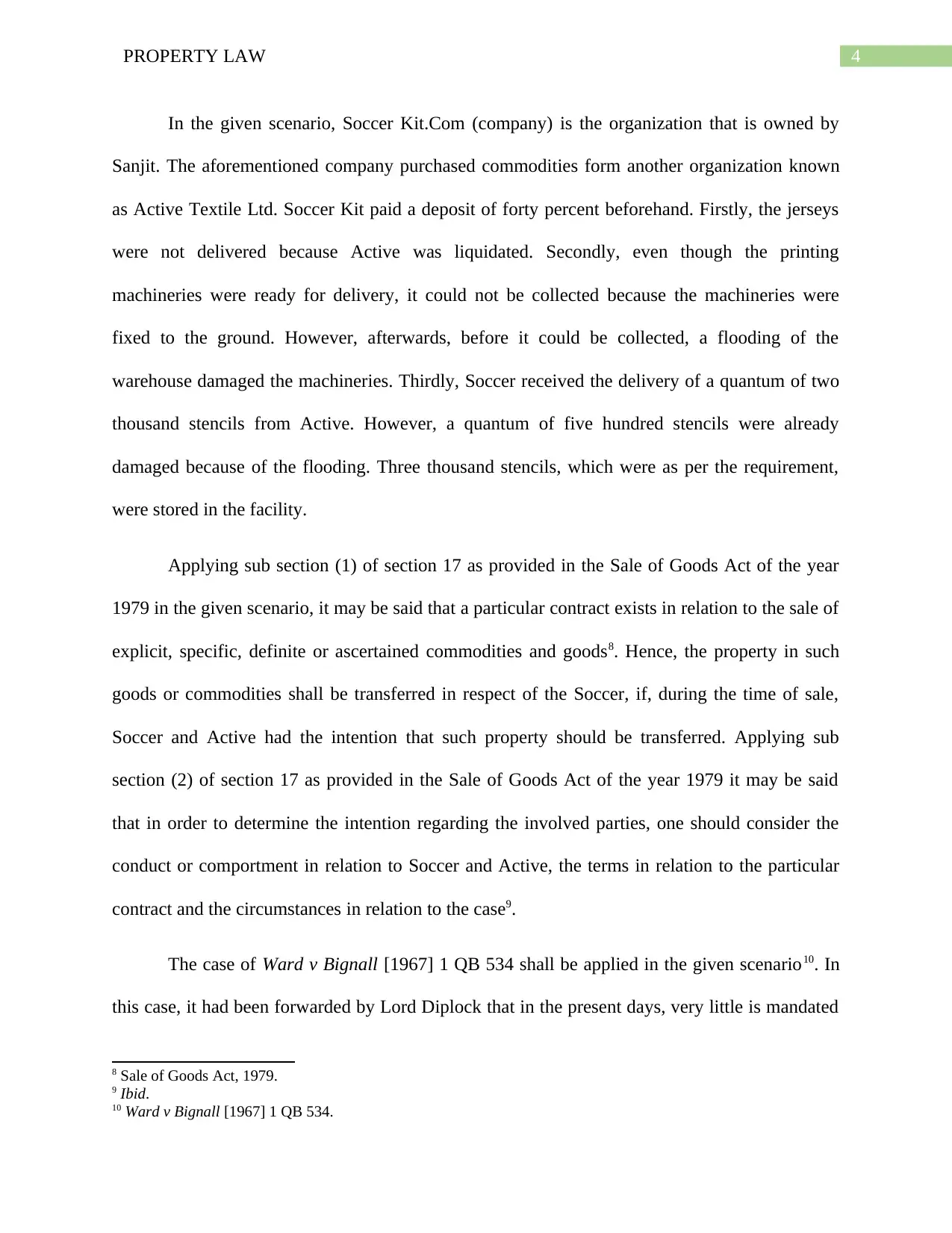
4PROPERTY LAW
In the given scenario, Soccer Kit.Com (company) is the organization that is owned by
Sanjit. The aforementioned company purchased commodities form another organization known
as Active Textile Ltd. Soccer Kit paid a deposit of forty percent beforehand. Firstly, the jerseys
were not delivered because Active was liquidated. Secondly, even though the printing
machineries were ready for delivery, it could not be collected because the machineries were
fixed to the ground. However, afterwards, before it could be collected, a flooding of the
warehouse damaged the machineries. Thirdly, Soccer received the delivery of a quantum of two
thousand stencils from Active. However, a quantum of five hundred stencils were already
damaged because of the flooding. Three thousand stencils, which were as per the requirement,
were stored in the facility.
Applying sub section (1) of section 17 as provided in the Sale of Goods Act of the year
1979 in the given scenario, it may be said that a particular contract exists in relation to the sale of
explicit, specific, definite or ascertained commodities and goods8. Hence, the property in such
goods or commodities shall be transferred in respect of the Soccer, if, during the time of sale,
Soccer and Active had the intention that such property should be transferred. Applying sub
section (2) of section 17 as provided in the Sale of Goods Act of the year 1979 it may be said
that in order to determine the intention regarding the involved parties, one should consider the
conduct or comportment in relation to Soccer and Active, the terms in relation to the particular
contract and the circumstances in relation to the case9.
The case of Ward v Bignall [1967] 1 QB 534 shall be applied in the given scenario10. In
this case, it had been forwarded by Lord Diplock that in the present days, very little is mandated
8 Sale of Goods Act, 1979.
9 Ibid.
10 Ward v Bignall [1967] 1 QB 534.
In the given scenario, Soccer Kit.Com (company) is the organization that is owned by
Sanjit. The aforementioned company purchased commodities form another organization known
as Active Textile Ltd. Soccer Kit paid a deposit of forty percent beforehand. Firstly, the jerseys
were not delivered because Active was liquidated. Secondly, even though the printing
machineries were ready for delivery, it could not be collected because the machineries were
fixed to the ground. However, afterwards, before it could be collected, a flooding of the
warehouse damaged the machineries. Thirdly, Soccer received the delivery of a quantum of two
thousand stencils from Active. However, a quantum of five hundred stencils were already
damaged because of the flooding. Three thousand stencils, which were as per the requirement,
were stored in the facility.
Applying sub section (1) of section 17 as provided in the Sale of Goods Act of the year
1979 in the given scenario, it may be said that a particular contract exists in relation to the sale of
explicit, specific, definite or ascertained commodities and goods8. Hence, the property in such
goods or commodities shall be transferred in respect of the Soccer, if, during the time of sale,
Soccer and Active had the intention that such property should be transferred. Applying sub
section (2) of section 17 as provided in the Sale of Goods Act of the year 1979 it may be said
that in order to determine the intention regarding the involved parties, one should consider the
conduct or comportment in relation to Soccer and Active, the terms in relation to the particular
contract and the circumstances in relation to the case9.
The case of Ward v Bignall [1967] 1 QB 534 shall be applied in the given scenario10. In
this case, it had been forwarded by Lord Diplock that in the present days, very little is mandated
8 Sale of Goods Act, 1979.
9 Ibid.
10 Ward v Bignall [1967] 1 QB 534.

5PROPERTY LAW
or required, which may result in the inference that the property in relation to the definite or
specific goods shall be passed only when the goods or commodities are delivered.
The case of Dennant v Skinner & Collom (1948) 2 KB ER 29 shall be applied in the
given situation11. In this case, it was mentioned that the parties that are involved should possess
the necessary intention at the time when the particular contract is being settled and concluded.
Hence, after the application of this case in the given situation, it may be said that when the
contracts in relation to the goods, were established between Active and Soccer, they should have
intended for the property in connection to the goods to be transferred.
The case of Clough Mill v Martin (1984) 3 ALL ER 982 shall be applied in the given
scenario12. In this case, a contract had been established. However, a condition was set by the
company (seller). The condition stated that the title in relation to the goods shall be retained by
the seller until the purchaser shall be able to make the payment, and if the purchaser makes a
default in making the payment then the seller shall have the right to enter the premises of the
purchaser and recover and recuperate the goods and the commodities for resale purposes.
Subsequently, the purchaser became insolvent prior to making the entire payment. The court held
that the clause regarding the retention in relation to the title, did not give rise to a charge in
connection to the yarn that is unutilized. The legal title in relation to the property had been
retained by the seller as a type of security. The action of the seller was successful. Hence, in the
given scenario, it may be said that there was no explicit condition specified by any of the
involved parties, regarding the retention of property in connection to the goods.
11 Dennant v Skinner & Collom (1948) 2 KB ER 29.
12 Clough Mill v Martin (1984) 3 ALL ER 982.
or required, which may result in the inference that the property in relation to the definite or
specific goods shall be passed only when the goods or commodities are delivered.
The case of Dennant v Skinner & Collom (1948) 2 KB ER 29 shall be applied in the
given situation11. In this case, it was mentioned that the parties that are involved should possess
the necessary intention at the time when the particular contract is being settled and concluded.
Hence, after the application of this case in the given situation, it may be said that when the
contracts in relation to the goods, were established between Active and Soccer, they should have
intended for the property in connection to the goods to be transferred.
The case of Clough Mill v Martin (1984) 3 ALL ER 982 shall be applied in the given
scenario12. In this case, a contract had been established. However, a condition was set by the
company (seller). The condition stated that the title in relation to the goods shall be retained by
the seller until the purchaser shall be able to make the payment, and if the purchaser makes a
default in making the payment then the seller shall have the right to enter the premises of the
purchaser and recover and recuperate the goods and the commodities for resale purposes.
Subsequently, the purchaser became insolvent prior to making the entire payment. The court held
that the clause regarding the retention in relation to the title, did not give rise to a charge in
connection to the yarn that is unutilized. The legal title in relation to the property had been
retained by the seller as a type of security. The action of the seller was successful. Hence, in the
given scenario, it may be said that there was no explicit condition specified by any of the
involved parties, regarding the retention of property in connection to the goods.
11 Dennant v Skinner & Collom (1948) 2 KB ER 29.
12 Clough Mill v Martin (1984) 3 ALL ER 982.
⊘ This is a preview!⊘
Do you want full access?
Subscribe today to unlock all pages.

Trusted by 1+ million students worldwide
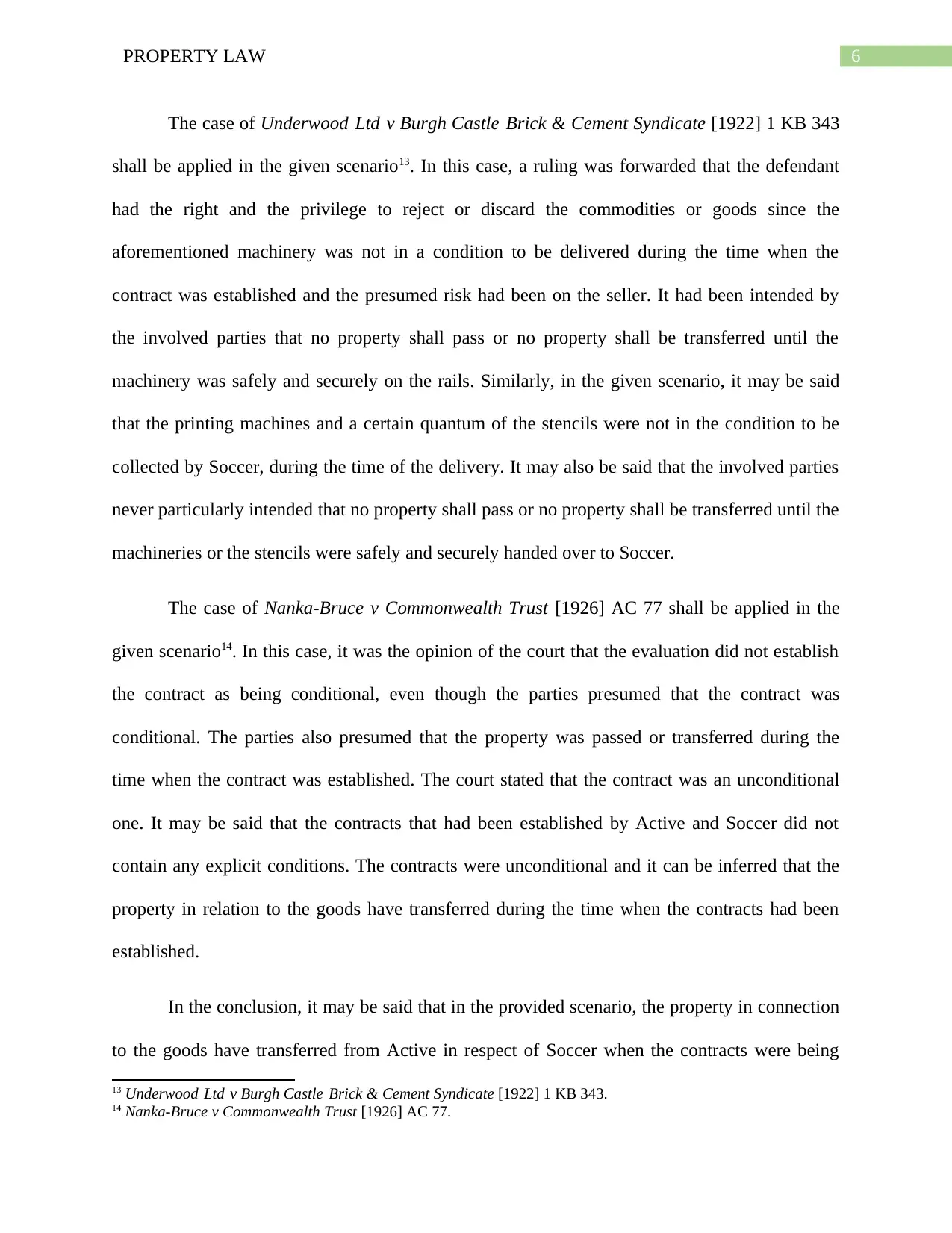
6PROPERTY LAW
The case of Underwood Ltd v Burgh Castle Brick & Cement Syndicate [1922] 1 KB 343
shall be applied in the given scenario13. In this case, a ruling was forwarded that the defendant
had the right and the privilege to reject or discard the commodities or goods since the
aforementioned machinery was not in a condition to be delivered during the time when the
contract was established and the presumed risk had been on the seller. It had been intended by
the involved parties that no property shall pass or no property shall be transferred until the
machinery was safely and securely on the rails. Similarly, in the given scenario, it may be said
that the printing machines and a certain quantum of the stencils were not in the condition to be
collected by Soccer, during the time of the delivery. It may also be said that the involved parties
never particularly intended that no property shall pass or no property shall be transferred until the
machineries or the stencils were safely and securely handed over to Soccer.
The case of Nanka-Bruce v Commonwealth Trust [1926] AC 77 shall be applied in the
given scenario14. In this case, it was the opinion of the court that the evaluation did not establish
the contract as being conditional, even though the parties presumed that the contract was
conditional. The parties also presumed that the property was passed or transferred during the
time when the contract was established. The court stated that the contract was an unconditional
one. It may be said that the contracts that had been established by Active and Soccer did not
contain any explicit conditions. The contracts were unconditional and it can be inferred that the
property in relation to the goods have transferred during the time when the contracts had been
established.
In the conclusion, it may be said that in the provided scenario, the property in connection
to the goods have transferred from Active in respect of Soccer when the contracts were being
13 Underwood Ltd v Burgh Castle Brick & Cement Syndicate [1922] 1 KB 343.
14 Nanka-Bruce v Commonwealth Trust [1926] AC 77.
The case of Underwood Ltd v Burgh Castle Brick & Cement Syndicate [1922] 1 KB 343
shall be applied in the given scenario13. In this case, a ruling was forwarded that the defendant
had the right and the privilege to reject or discard the commodities or goods since the
aforementioned machinery was not in a condition to be delivered during the time when the
contract was established and the presumed risk had been on the seller. It had been intended by
the involved parties that no property shall pass or no property shall be transferred until the
machinery was safely and securely on the rails. Similarly, in the given scenario, it may be said
that the printing machines and a certain quantum of the stencils were not in the condition to be
collected by Soccer, during the time of the delivery. It may also be said that the involved parties
never particularly intended that no property shall pass or no property shall be transferred until the
machineries or the stencils were safely and securely handed over to Soccer.
The case of Nanka-Bruce v Commonwealth Trust [1926] AC 77 shall be applied in the
given scenario14. In this case, it was the opinion of the court that the evaluation did not establish
the contract as being conditional, even though the parties presumed that the contract was
conditional. The parties also presumed that the property was passed or transferred during the
time when the contract was established. The court stated that the contract was an unconditional
one. It may be said that the contracts that had been established by Active and Soccer did not
contain any explicit conditions. The contracts were unconditional and it can be inferred that the
property in relation to the goods have transferred during the time when the contracts had been
established.
In the conclusion, it may be said that in the provided scenario, the property in connection
to the goods have transferred from Active in respect of Soccer when the contracts were being
13 Underwood Ltd v Burgh Castle Brick & Cement Syndicate [1922] 1 KB 343.
14 Nanka-Bruce v Commonwealth Trust [1926] AC 77.
Paraphrase This Document
Need a fresh take? Get an instant paraphrase of this document with our AI Paraphraser

7PROPERTY LAW
established between them. It may also be said that Soccer made an advanced payment of forty
percent of the entire amount, regarding the goods and commodities, in favor of Active, which
emphasizes the fact that Soccer has accepted the transference of the property in relation to the
aforementioned goods and commodities.
established between them. It may also be said that Soccer made an advanced payment of forty
percent of the entire amount, regarding the goods and commodities, in favor of Active, which
emphasizes the fact that Soccer has accepted the transference of the property in relation to the
aforementioned goods and commodities.
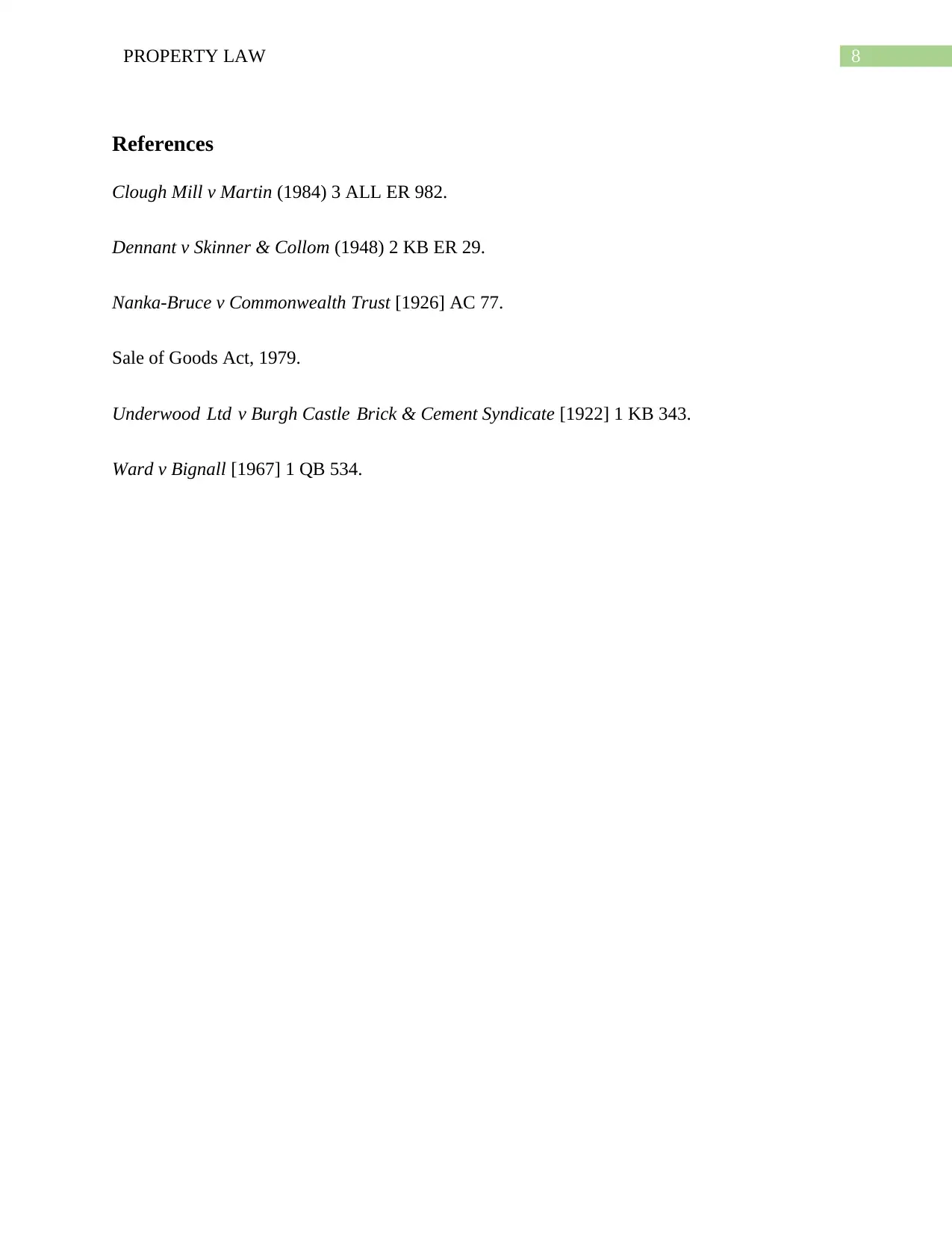
8PROPERTY LAW
References
Clough Mill v Martin (1984) 3 ALL ER 982.
Dennant v Skinner & Collom (1948) 2 KB ER 29.
Nanka-Bruce v Commonwealth Trust [1926] AC 77.
Sale of Goods Act, 1979.
Underwood Ltd v Burgh Castle Brick & Cement Syndicate [1922] 1 KB 343.
Ward v Bignall [1967] 1 QB 534.
References
Clough Mill v Martin (1984) 3 ALL ER 982.
Dennant v Skinner & Collom (1948) 2 KB ER 29.
Nanka-Bruce v Commonwealth Trust [1926] AC 77.
Sale of Goods Act, 1979.
Underwood Ltd v Burgh Castle Brick & Cement Syndicate [1922] 1 KB 343.
Ward v Bignall [1967] 1 QB 534.
⊘ This is a preview!⊘
Do you want full access?
Subscribe today to unlock all pages.

Trusted by 1+ million students worldwide
1 out of 9
Related Documents
Your All-in-One AI-Powered Toolkit for Academic Success.
+13062052269
info@desklib.com
Available 24*7 on WhatsApp / Email
![[object Object]](/_next/static/media/star-bottom.7253800d.svg)
Unlock your academic potential
Copyright © 2020–2026 A2Z Services. All Rights Reserved. Developed and managed by ZUCOL.





